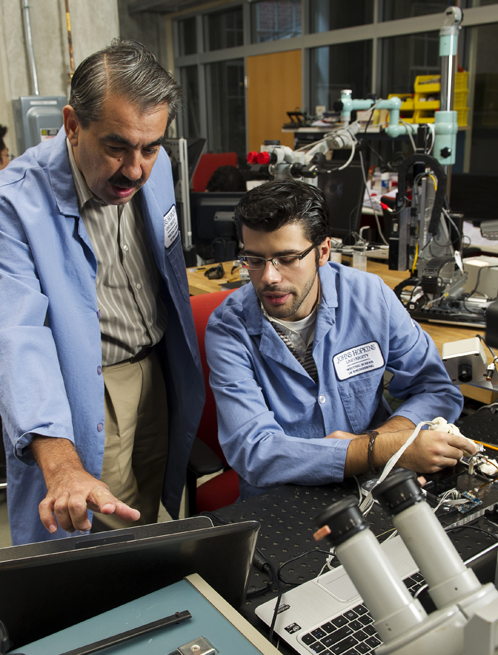Calendar
Participants from the public and private sectors are invited to attend the JHU Robotics Industry Day, hosted by the Laboratory for Computational Sensing and Robotics, to see cutting-edge robotics research and explore university-corporate partnerships.
Meet robotics experts at Hopkins and discuss furthering robotics research, education and commercialization in healthcare, manufacturing, defense, space exploration, environmental science and transportation.
Agenda
- 08:00 AM Registration/continental breakfast – Mason Hall, Homewood Campus
- 08:30 AM Welcome by Ed Schlesinger, Dean Whiting School of Engineering
- 08:40 AM Introduction to LCSR – Russell Taylor, Director
- 09:10 AM Overview and Updates of LCSR Robotics Research
-
- Medical Robotics & Computer Assisted Surgery – Russell Taylor
- Human Machine Collaborative Systems – Gregory Hager
- Robots for Extreme Environments- Louis Whitcomb
- Robotics and Biological Systems- Noah Cowan
-
- 10:30 AM Break
- 10:45 AM LCSR Highlight Talks
- 11.30 AM LCSR Education Programs
- 11:40 AM LCSR Spin Off Companies
- 12:00 Noon JHU/LCSR Industry Programs
-
- Partner Program
- Fellowship Program
- Funding Mechanisms for University/Industry Collaborations
-
- 12:30 PM Lunch, Poster and Demo Session, Lab Tours, and Meet Students and Faculty- Hackerman B08
-
Register now
Abstract
The humanoid robot DURUS was unveiled to the public in the midst of the DARPA Robotics Challenge (DRC). While the main competition took place in the stadium, DURUS took part in the Robot Endurance Test with the goal of demonstrating locomotion that is an order of magnitude more efficient than existing bipedal walking on humanoid robots, e.g., the ATLAS robot utilized in the DRC. During this accessible public demonstration of humanoid robotic walking, DURUS walked continuously for over 2½ hours covering over 2 km—all on a single 1.1 kWh battery. At the core of this success was a methodology for designing and realizing dynamic and efficient walking gaits on bipedal robots through a mathematical framework that utilizes hybrid systems models coupled with nonlinear controllers that provably result in stable locomotion. This mathematical foundation allowed for the full utilization of novel mechanical components of DURUS, including: efficient cycloidal gearboxes (allowing for almost lossless transmission of power) and compliant elements at the ankles (absorbing the impacts at foot-strike). Through this combination of formal controller design and novel mechanical design, the humanoid robot DURUS was able to achieve the most efficient walking ever recorded on a humanoid robot. This talk will outline the key elements of the methodology used to achieve this result, demonstrate the extensibility to other bipedal robots and robotic assistive devices, e.g., prostheses, and consider the question: when will the humanoid robots of science fiction become science fact?
Speaker Bio
Aaron D. Ames joined the Georgia Institute of Technology in July 2015 as an Associate Professor in the George W. Woodruff School of Mechanical Engineering and the School of Electrical and Computer Engineering. Prior to joining Georgia Tech, he was an Associate Professor and Morris E. Foster Faculty Fellow II in Mechanical Engineering at Texas A&M University, with joint appointments in Electrical & Computer Engineering and Computer Science & Engineering. Dr. Ames received a B.S. in Mechanical Engineering and a B.A. in Mathematics from the University of St. Thomas in 2001, and he received a M.A. in Mathematics and a Ph.D. in Electrical Engineering and Computer Sciences from UC Berkeley in 2006. He served as a Postdoctoral Scholar in Control and Dynamical Systems at the California Institute of Technology from 2006 to 2008. At UC Berkeley, he was the recipient of the 2005 Leon O. Chua Award for achievement in nonlinear science and the 2006 Bernard Friedman Memorial Prize in Applied Mathematics. Dr. Ames received the NSF CAREER award in 2010 for his research on bipedal robotic walking and its applications to prosthetic devices, and is the recipient of the 2015 Donald P. Eckman Award recognizing an outstanding young engineer in the field of automatic control. His lab designs, builds and tests novel bipedal robots, humanoids and prostheses with the goal of achieving human-like bipedal robotic walking and translating these capabilities to robotic assistive devices.



